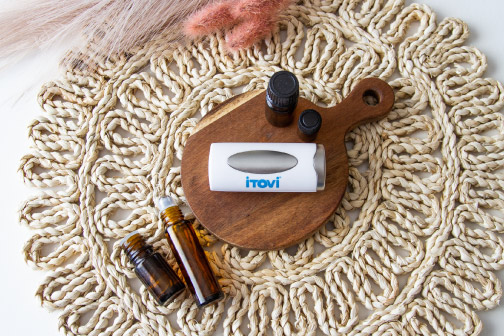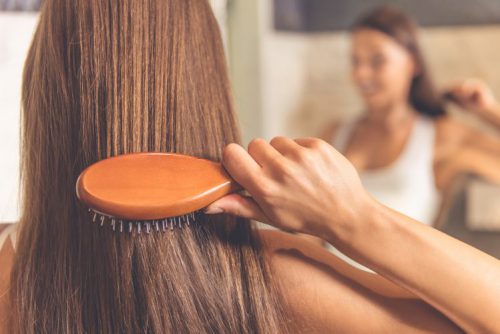
If your body were a company—your immune system would be that quiet, behind-the-scenes worker whose incredible diligence keeps the company on its feet.
Unfortunately, she’s also that worker who 1) doesn’t get as much credit as she deserves, 2) often isn’t given as much support as she deserves, and 3) is only remembered when something goes wrong and we need someone to blame for our stuffy noses and sore throats.
It’s sad, but true—how many of us actually work immune-system care into our wellness plan?
Nevertheless, the immune system soldiers on—doing its best every day, every hour, to protect us from both external threats (like bacteria, viruses, etc) and from internal threats (inflammation, cancerous cells, etc).
And though we can’t really afford to give the immune system a day off (we really do need her 24/7 protection), there are things we can do! We can lessen the pressure on her, help keep her tools/structures in tip-top shape, and pamper her with essential oils!
How to Support Your Immune System
Step 1: Lighten the Load
Your immune system fights a lot of threats to your body. But you can lighten its load by making sure that fewer germs and toxins make it close enough to test your body’s defenses.
As the saying goes, “An ounce of prevention is worth a pound of cure.”
Provide Necessary Nutrients & Antioxidants
It is said that 70% of your immune system is in your gut! (Or in other words, in your digestive tract.)
Why is this so? Because 1) a healthy gut creates the antibodies your immune system needs to function and because 2) your immune system can only function if it gets the right vitamins and minerals from your gut. And where does your gut get those nutrients from? From your diet.
This is why, if you want to start supporting your immune system, the best place to start is with a healthy diet!
(On the other hand, if you’re eating poorly or, goodness forbid, uncleanly, this allows bacteria and other nasties to get into your body through your diet, putting extra stress on your immune system.)
What can you do?
- Eat a balanced diet (probiotics, prebiotics, fiber, and nutritious fruits and vegetables are a must!). Find EO-inclusive recipes on the iTOVi Blog!.
- Eat as cleanly as possible. Buy clean food, wash your produce before eating it, and keep your kitchenware clean.
- Provide your body with antioxidants. (These are found in raw berries, pecans, artichokes, and many of your favorite essential oils!)
Give Your Body a Clean Environment to Live In
The diet isn’t the only way where bacteria, viruses, and other immune-system enemies can get into your body. Many of these build up on household surfaces or travel through the air and eventually find their way into your body through your lungs, skin, or other means.
Ergo, living in a clean environment helps keep the immune system’s workload to a more manageable level.
But—life being what it is—it takes some work to keep our environments clean!
What can you do?
- Keep the air in your home clean. This can be done with proper air-conditioning, airing out, air-purifying machines and plants, and essential oils! For more details check out our guide: Air Purification & Essential Oils
- Use natural cleaning products where you can. Chemical-laden cleaning products, while they may kill bacteria, can add their own toxins to your home and to your body. Find a great DIY essential oil cleaning solution recipe here.
- Clean regularly. Give special attention to places where germs are likely to build up and spread, i.e. the kitchen sink, bathroom, kitchen trash can, shoes, and oft-touched places like doorknobs, handles, switches, and throw pillows.
Get the Right Amount of High-Quality Sleep
Much like your brain, your immune system has essential work to do that it can only do with maximum efficiency when you get your proper 7-8 hours of sleep (4-6 sleep cycles).
According to the Sleep Foundation, sleep allows your body to build up essential immune cells, respond effectively to vaccines, and even reduce your allergic reactions!
On the other hand, inadequate sleep will weaken your immune system, making it easier for it to get overloaded, and making you more likely to get sick.
What can you do?
- Get to bed at a regular time (Bonus tip: Between 10-11 is the heart-healthiest time to go to bed.)
- Arrange and follow a pre-bedtime routine, including ways to help your mind and body relax so you can fall asleep quickly. (Did somebody say lavender?) Also, try to follow a morning routine to get you up at the right hour. This helps keep your sleep schedule regular and balanced.
- Optimize your sleeping space. Use blackout curtains, a white noise machine, a better mattress, or whatever else helps you get to sleep and stay asleep.
Manage Your Stress Levels
Yes, you’ve heard this bit of advice a thousand times. But just to recap the relationship between stress and the immune system…
Your body knows when you are stressed. And when it reads “stress” in you (whether it is about finances, social relationships, or just excess physical stress or mental stress), it just can’t help but try to fix the problem by sending out stress hormones, inflammation cues, and other immune-affecting measures.
If this goes on too long, you get lowered numbers of immune cells, more inflammation than is helpful for your body, and you become more vulnerable to infection.
Now—life can be and often is stressful. That’s just a fact. But with a little extra self-awareness, organization, and effort, we can keep our stress levels from sabotaging our immune systems and our overall quality of life.
What can you do?
- Track your stress levels. You cannot manage what you are not aware of. This can be as simple as stopping regularly to check in with yourself, allowing a trusted friend to check in with you, keeping a “stress journal”, using stress-tracking apps or watches, or regular iTOVi Scans.
- Find stress-relief methods that work for you and use them. This could be a couple minutes of meditation, creativity, a nap, a nature walk, a call to your best friend— whatever else works for you to lower your stress. We recommend studying your iTOVi Scan Reports to find the best oils to accompany you on a stress-reset break.
- Do the wellness basics. The simple, most basic things we do to take care of ourselves (like getting enough sleep, eating right, exercising, and fulfilling our social needs) ALL contribute enormously to our ability to manage our stress. Prioritize the basics and you won’t regret it!
Exercise Regularly
It’s possible that you were dreading this part—but hear us out!
Exercising provides triple benefits for your immune system by:
1) getting the blood flowing in your veins and the air running through your lungs, which helps flush bacteria and fat-bound toxins out of your system
2) increasing the number of white blood cells in your body (your immune system cannot function without these cells)
3) taking pressure off the immune system by reducing bodily inflammation
It’s a win-win-win! And before we attempt to lure you into the gym with promises of more mental energy, better mood, and longevity from regular exercising (which are all true, by the way)—let us reassure you that exercising for your health doesn’t have to be as hard as you likely imagine.
You don’t need to drive yourself to the point of exhaustion, heavy panting, and miserable, side-stitching pain. Those come when you are pushing yourself too hard.
All you need is to reach 50-70% of your maximum heart rate and spend 150 minutes a week there! For many, this can be accomplished with a brisk daily walk! (You might choose to break this up into 22 minutes a day or 50 minutes three times a week).
What can I do to make sure I get my exercise in?
- Have a plan. Know when, where, and how you will get your exercise in. Make plans to overcome obstacles that might keep you from fulfilling your plan.
- Don’t be fooled by the “energy threshold”. When it’s time to do some physically or emotionally demanding task—we often feel reluctant. It’s as if our body is saying, “Ain’t nobody got enough energy for that!” But then, once we get started—we find that we had more energy available to us than we supposed! We find the task easier than we thought and we actually enjoy doing it (or at least don’t regret pushing through and getting it done). The hardest part is often getting started.
- Use invigorating essential oils as a cue to get you started! Citrus scents are popular for this purpose. And you can also use oils to give your muscles a nice rub down once you are done exercising!
It’s important to do what we can to lighten the load on our immune systems.
But life is life, and apart from living inside a plastic bubble—we can’t keep all bacteria, viruses, and whatnot away from us.
And that brings us to…
Step 2: Reinforce the Immune System’s First Layers
When a bacterium, virus, pathogen, microbe, or any other nasty thing approaches your body, the immune system’s first layers of defense are the skin and the mucus.
Support the Skin as a Defensive Layer
Your skin does more than just make you look pretty and keep your insides on the, um, inside.
Your skin’s job is to keep bacteria, spores, and other bad things out and only let good stuff (moisture, vitamin D, etc) in.
But when your skin gets too dirty, dry, or damaged, your skin can’t do as good a job of protecting you and it is more likely to let the flu virus, toxic air chemicals, or other bad things into your body!
What can I do?
- Do the wellness basics. All the basic things you would think to do for your health—like eating healthily, getting enough sleep and fresh air, exercising, and staying hydrated all help your skin stay in good shape!
- Have a skincare routine. It’s not about being a diva (though who doesn’t like to have clear, smooth, healthy skin?)—it’s about cleaning your skin, so it can do its job better. A skincare routine helps provide your skin with all the moisture, nutrients, and protection it needs to stand strong against micro invaders! And essential oils can be a great help in a personal skincare routine! Learn more about skin care with essential oils here.
- Take care of all of your skin. It’s not just the skin on your face that keeps out threats! The skin all over your body needs care! The best thing to do is to shower regularly with warm (not hot, sorry) water, scrub your skin thoroughly with soap, and moisturize well.
- Use sunscreen. Your skin needs juuuust the right amount of sun—enough to get in your Vitamin D, yes, but not so much that the cells get fried! The Skin Cancer Foundation recommends wearing sunscreen every day, applying it 30 minutes prior to going outdoors and reapplying every two hours.
- Don’t smoke. Smoking is terrible for both your skin and for your lungs. If you are smoking, try to quit and don’t be afraid to ask for help!
Support Your Lungs & Airway
Your respiratory system is a potential avenue for dust, bacteria, and other bad things to get into your body and mess with your immune system.
Fortunately, your airways have a secret weapon—mucus. Mucus traps dust, bacteria, and other invaders and flushes them out of your body before they can get to your tissues or your bloodstream to do damage.
However, it is important to remember that 1) our mucus can only handle so much, 2) you need healthy lungs to produce the right amount of mucus, 3) excessive dry air can irritate and weaken the lungs, and 4) air that is too humid can help bacteria and microbes multiply.
What Can I Do?
- Do the wellness basics. Once again, just doing the basic things, like eating healthily, and getting enough sleep can help strengthen your lungs. And both exercising and staying hydrated are especially good for your lungs!
- Watch your air quality. Determine whether your home air quality could benefit from a humidifier or a dehumidifier. Also, learn how to purify the air around you with essential oils!
- Keep your environment clean. A lot of microbes rest on home surfaces and travel from our hands to our faces, noses, and mouths. So wash your hands often and try not to touch your face too much! Also, see the “Give Your Body a Clean Environment to Live In” section above for more tips!
- Don’t smoke. We repeat, smoking is terrible for both your skin and for your lungs. If you are smoking and trying to quit, don’t be afraid to ask for help!
Sometimes, after all we can do, threats to our health stil get past our first layers of defense. But all is not lost!
You still have your main immune system ready to fight for you! And this includes your constantly-working innate immune response, which is pretty much made up of a bunch of cells that use general measures to find and eliminate any and all health threats, and your adaptive immune response, which builds cells to fight specific threats.
Can essential oils help bolster the immune system?
The answer to this question comes in two parts.
Firstly, essential oils, when used in the right way, can certainly help support the immune system, as they can provide antioxidants, fight inflammation, and enhance many of the supportive measures listed above.
Secondly, essential oils show potential in boosting the activity of the innate and adaptive immune systems—but there is still too much research to do to say for sure.
Or, as one recent review from the National Institute of Health put it, “Scientific evidence on the immunostimulatory effects of EOs is rather fragmentary, but there seems to be a potential for certain EOs to be able to enhance some immune functions.” And the same is generally held true for immunomodulatory effects.
At this point, eucalyptus, ginger, lavender, frankincense, and oregano are the most promising essential oils.
Bonus: When to Take Special Care of Your Immune System
There are times when your immune system is sure to be more vulnerable. These times include:
-
- When traveling – Your body gets used to a certain environment. And traveling may catch your immune system off guard with new threats, a disrupted circadian rhythm, added stress, etc. So be doubly good to your immune system while traveling!
- During significant life or lifestyle changes/transition – (i.e. end of the school year, relationship break up, new job, seasonal changes, etc) We all have a tendency to “slow down at the corners”, so give your immune system extra support during these times to help it adjust!
- Late at night – Your immune system works with your circadian rhythm and uses nighttime to focus on building up the adaptive immune system. Unfortunately, this can leave you more vulnerable to immunological threats during nighttime hours! Consider adapting your wellness plan to give you extra immune support at night.
- During the winter – Winter often increases our time spent indoors and our levels of bodily stress—both of which can increase pressure on the immune system. So don’t neglect your immune-supportive habits during the winter!
Class Ideas |
|




